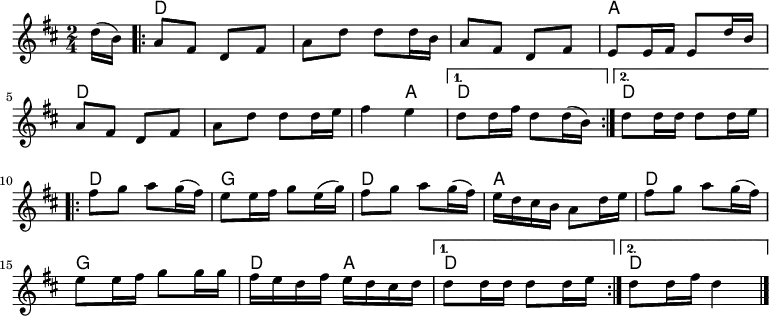"Soldier's Joy" is a fiddle tune, classified as a reel or country dance.[1] It is popular in the American fiddle canon, in which it is touted as "an American classic"[1] but traces its origin to Scottish fiddling traditions.[2] It has been played in Scotland for over 200 years, and Robert Burns used it for the first song of his cantata 'The Jolly Beggars'.[2] According to documentation at the United States Library of Congress,[3] it is "one of the oldest and most widely distributed tunes"[1] and is rated in the top ten most-played old time fiddle tunes. The tune dates as early as the 1760s.[4] In spite of its upbeat tempo and catchy melody, the term "soldier's joy" has a much darker meaning than is portrayed by the tune. This term eventually came to refer to the combination of whiskey, beer, and morphine used by American Civil War soldiers to alleviate pain.
Score

Melody as basis for song
Like many pure tunes with ancient pedigree, the melody of Soldier's Joy has been used as a basis for construction of songs, which, unlike pure tunes, have lyrics. Robert Burns wrote lyrics for the tune in which a dismembered, homeless veteran sarcastically recounts his delight with battle.
Civil War era and post-bellum cultural references
The tune came to represent substance use to alleviate pain during the Civil War.[4] This is corroborated in concurring secondary sources.
The IHIC version is as follows:
Twenty-five cents for whiskey, twenty-five cents for beer
Twenty-five cents for morphine, get me out of here
Chorus:
I'm my momma's pride and joy (3×)
Sing you a song called the soldier's joy
Country
Twenty-five cents for whiskey, twenty-five cents for beer
Twenty-five cents for morphine get me out of here
Chorus:
I'm my momma's pride and joy (3×)
Sing you a song called the soldier's joy
Grasshopper sitting on a sweet potato vine (3×)
Along come a chicken and he's say "you're mine"
I'm gonna get you there don't you want to go? (3×)
All for the soldier's joy
Chicken in a bread pan scratching that dough
Granny does your dog bite no child no[6]
All for the soldier's joy[7]
See also
References
- 1 2 3 "Soldier's Joy An American Classic". American Memory. Library of Congress.
- 1 2 "Soldier's Joy". Education Scotland. Archived from the original on 23 June 2016. Retrieved 3 July 2016.
- ↑ "Library of Congress American Memory".
- 1 2 "Soldier's Joy. Performed by Mr. Charles Wright, Recorded by Professor McIntosh August 1954". Archived from the original on 2011-07-08.
- ↑ "Soldiers Joy Lyrics by Guy Clark". countryfriends.dk. Archived from the original on 2011-08-09. Retrieved 2011-07-22.
- 1 2 "The Skillet Lickers were very influential in the 1920s–30s building the bridge that connected Appalachian folk music to modern popular music and gave respectability to the formerly ridiculed "hillbilly" music." Liner note posted by preservationhall01, posted May 1, 2009. Other lyrics are "25 cents for the morphine that will take me away from here". Gid Tanner & The Skillet Lickers – Soldiers Joy – 1929 (w/film clip) https://www.youtube.com/watch?v=_p952jSLddg&feature=fvst
- ↑ Note: These lyrics are well known to fiddlers and to the public as 'quoted' in Charlie Daniels' song "The Devil Went Down to Georgia". A Traditional music library
External links
- Jeff Todd Titon's Old-Time Kentucky Fiddle Tunes (University of Kentucky Press)
- Digital Library of Appalachia provides online access to archival and historical materials related to the culture of the southern and central Appalachian region. The contents of the DLA are drawn from special collections of Appalachian College Association member libraries.
- 1929 Skillet Lickers film clip with commentary
- Henry Reed Library of Congress mp3
- Solo fiddle version 1 on YouTube